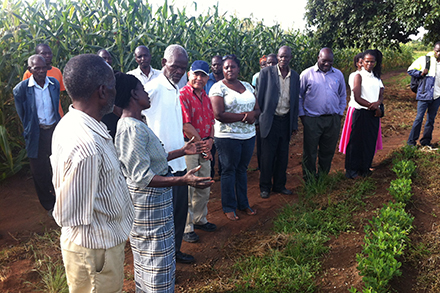Two of Heifer’s programs from Southern Africa, were recently awarded grants totaling a combined $5.3 million to support the smallholder farmers and programs currently in place.
Heifer Malawi received two grants that totaled $1.9 million, while Heifer Zambia also received two grants totalling $3.4 million.
The Development Fund of Norway (DFN) awarded heifer Malawi’s first grant, which is for the Sustainable Agriculture Lead Farmer Program (SALFP).DFN has been implementing the Malawi-Zambia (MAZA) project with the help of many local organizations. The project has recorded substantial success with smallholder farmers practicing sustainable farming technologies. In order to scale-up and build on the success of MAZA, DFN submitted a concept for SALFP to the Norwegian Embassy in Malawi, which was later approved.
Learn how you can help farmers in areas like Malawi and Zambia.
Heifer's role in the program is to strengthen the livestock component and assist more than 24,390 families. Heifer will support a dairy group consisting of 3,500 families with pure and crossbred heifers. Other resources include meat goats (5,750 families), chickens (13,000 families) and horticultural crop seeds (1,750 families). The project will be implemented through May 2019 and is fully funded by DFN through the Norwegian Government.
The second grant is from the Government of Malawi for the Matapwata Dairy Improvement Project (M-DiP). This project will be implemented in the Thylo District of Malawi with a focus on building the capacity of 1,000 smallholder farmers through training in order to ensure increased dairy productivity.
M-Dip will implement extensive training programs targeting dairy farmers who are building technical capacity in dairy production, agribusiness and cooperative management. The farmers will be trained in animal healthcare and husbandry practices to ensure good animal management and increased milk yields. Using the lead farmer approach, Heifer's training program is expected to increase the coverage of extension services to farmers.

The project will also scale-up existing breeding programs and engage producers in village savings and loans activities. This has been proven to boost a farmer's working capital and income. The project will adopt Heifer's Dairy Business Hub Model and encourage the participation of private entrepreneurs and service providers. The project implementation period is through June 2019.
Heifer Zambia also received two grants, both of which total $3.4 million—one from the government of Zambia and a sub-grant awarded by Oxfam, from a larger award from Department for International Development, an agency of the government of the United Kingdom.
The first grant awarded in July 2014 and will be implemented through June 2019. Through this grant, Heifer Zambia will contribute to the success of the Government Livestock Stocking and Restocking Program (LRP) by implementing the Luapula Livestock Development Program (LLDP) in the Mwansambomwe District.
This project aims to reduce poverty and establish food security in Mwansambomwe by supporting 6,000 small-holder farmers, particularly women, in the development of livestock enterprises through the provision of cattle, goats and chickens. Seventy percent of beneficiaries will be women farmers.
The second grant for a project called Scaling up Smallholder Access to Market started in April 2014 and continues through April 2016. Heifer will implement this project in partnership with Oxfam Zambia in the mineral-rich Copperbelt region of the country, which has been facing economic hardship since the decline in the price of copper in the 1970s.
Today, as the future economic prosperity of the region turns to agriculture, the project aims to improve agriculture productivity through innovative approaches to reintegration into the productive sector. This will be achieved by supporting the resilience of households and helping them increase their agriculture yields in a sustainable manner. The project will introduce high quality breeds of dairy cattle and high yielding varieties of soya beans.
Dairy income has a high potential that has proven to completely transform households from living on a subsistence basis to being able to grow and expand their productive activities while soy beans have been highlighted in government strategic plans to reduce domestic fuel costs.
Heifer Malawi and Heifer Zambia are working toward a brighter tomorrow. The plans that Malawi and Zambia have for their grants will no doubt improve the lives of smallholder farmers and South Africans as a whole.
Story courtesy of Heifer Africa
Photos courtesy of Lisa Dixon, Africa Program Manager